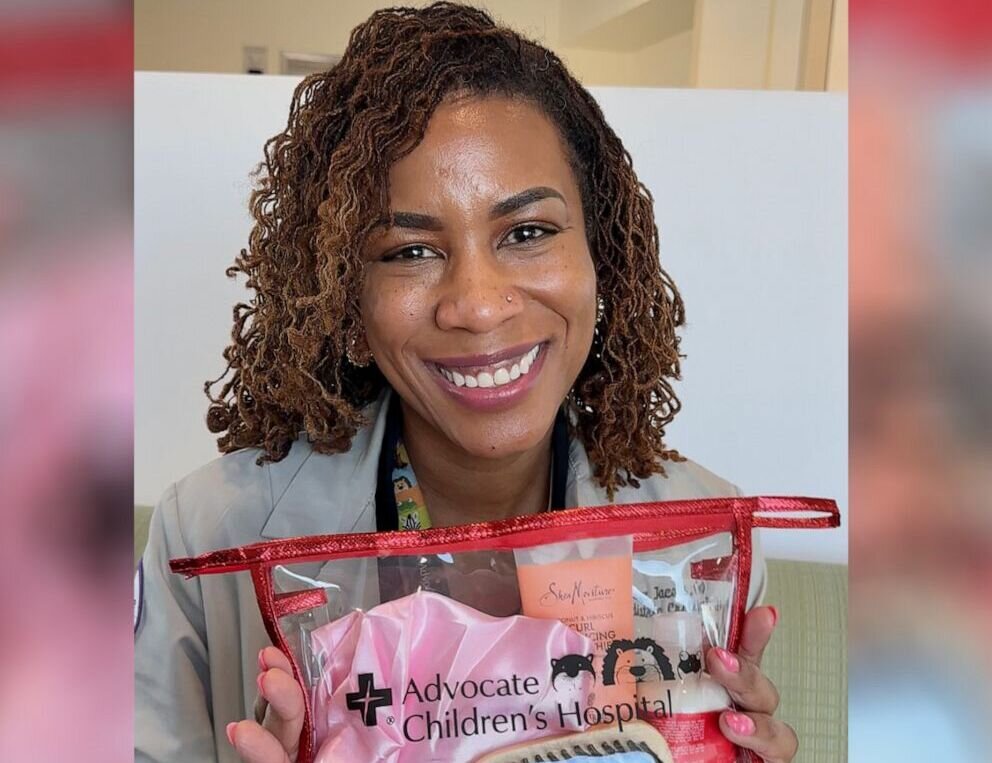For Dr. Nekaiya “Kay” Jacobs, a pediatric critical care physician at Advocate Children’s Hospital in Illinois, helping youngsters to heal and grow is the utmost priority. Although providing the best possible care is a pledge for all medical professionals, her genuine empathy and champion for the less obvious, critical details—those that strengthen therapeutic relationships and make patients feel whole—are why she is especially making an enormous difference in their physical and emotional well-being.
The 11-year healthcare veteran understands how race plays a crucial role in patient care, specifically the profound relationship between people of color and textured hair. She also recognizes how it has already taken shape in her patients’ budding identities, so when these considerations are upheld in traumatic medical situations, they too, have an extraordinary ability to assist them in healing more quickly.
While anyone would understand why the maintenance of a cute hairstyle may not always rank high on to-do lists of distressed parents of children who are under intensive care, Dr. Jacobs, however, was witnessing something seriously different about it. She observed an alarming pattern of adverse hair events among her patients with curly and coily hair, one patient for example—she was bedridden due to loss of mobility—had suffered severe baldness in the back of her head.
The lack of suitable hair care hit home for Jacobs, and she felt compelled to help. Initially, what started out as only small acts of kindness—she’d bring in extra hair products, tools and supplies from home for those who needed them—transformed into a fully-developed, inclusive hair care kit program, organized by her and the support of her colleagues. Together, they established a textured hair care council within the hospital at Advocate Children’s, jumpstarting the endeavor with an endowment garnered from the hospital’s diversity and inclusion budget earlier this year.
The group began distributing the free hair kits this past January, circulating approximately 200 of them to all of the hospital’s campuses, as it raised several requests from other service divisions that also expressed an interest in supplying them. Made up of small clear pouches that contain products specifically designed for textured hair, including shampoo, conditioner, a wide-toothed comb, a bristle hair brush and a colorful bonnet, these thoughtful, little gestures were a hit with patients and their parents, the feedback overwhelming.
Even though it’s only been less than a year, Jacobs and the team at Advocate Children’s hope to expand the inclusive hair kits program further in the near future. But on a more personal level, Jacobs believes its benefits go far beyond aesthetic reasons for patients because it takes their minds off health challenges and being in the hospital, only if temporary. She has shared with Good Morning America how they have reminded her of why she pursued a career in medicine in the first place and how impactful her work can be in many other ways.
“Doing hair is a very important part of the day for our patients because we try to keep them, if possible, on a morning routine where they’re able to wake up, brush their teeth and do something as simple as put their hair in a ponytail,” Jacobs explains. “So this part of the day being able to do so with supplies that are specific to their hair texture has been really important to [the patients] and they get really excited about them.”
“We’re here to take care of all of you,” she tells her young patients. “Not just to give you medicine.”








